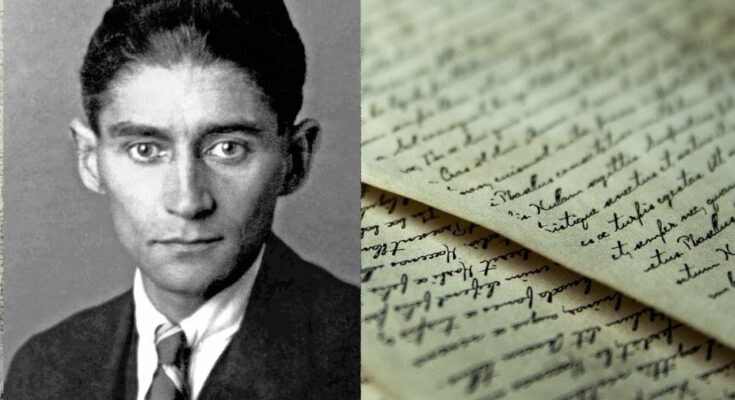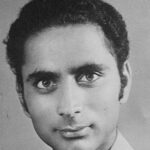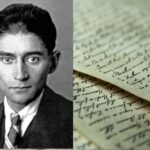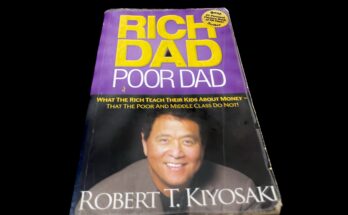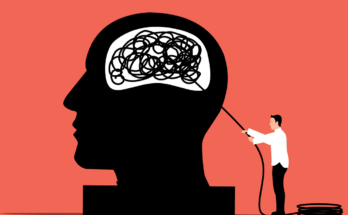I have the true feeling of myself only when I am unbearably unhappy.
— Franz Kafka
Franz Kafka’s internal struggle is reflected in his writing, and nowhere is this more apparent than in the complex narrative of his works, such as his famous Letter to His Father.
Yet, Kafka’s struggle to overcome doubt and meaninglessness extends beyond any single piece of writing; it runs through his life, his choices, and all his stories.
In this blog post, we explore Kafka’s painful wish to “Burn It All”, a plea to destroy all his writing, and how Max Brod’s act of friendship preserved a legacy Kafka himself never intended.
1/8
BURN IT ALL: How Kafka’s Friend Preserved His Legacy.By day, Kafka worked in an insurance office, buried in pointless paperwork. By night, he wrote, not grand epics but quiet horrors. pic.twitter.com/FI9t4krb5V
— Jasmeet (@HappinessDhaba) February 11, 2025
1. Kafka’s Silent Struggle: Trapped Between Meaning and Meaninglessness
Franz Kafka’s life seemed grounded in the mundane. By day, he worked a monotonous job in an insurance office, buried under piles of paperwork that felt meaningless.
Kafka was trapped in a system that drained his energy, yet his inner world was alive with existential questioning, a search for meaning beyond the confines of his routine.
Though his life appeared ordinary, Kafka’s thoughts were consumed by profound questions of existence. By night, he became a writer, pouring his anxieties, doubts, and reflections into stories that would eventually reshape literature.
Kafka once wrote,
I cannot make you understand. I cannot make anyone understand what is happening inside me. I cannot even explain it to myself.
This sentiment from The Trial underscores the essence of Kafka’s internal conflict, the struggle to communicate the profound isolation and confusion that defined his existence
Kafka could not see the value in his writing. Even as his stories began to take shape, he believed they would never matter. His self-doubt was overwhelming, and the idea of leaving a legacy was foreign to him.
2. Burn It All
In the final years of his life, Franz Kafka, plagued by illness and self-doubt, requested his closest friend, Max Brod,
Burn it all. Every unfinished novel, every fragmented thought. Let the words die with me.
Kafka’s wish to destroy his own works was a reflection of his deep uncertainty about their value. He believed his writing was unworthy of the world’s attention, that it was nothing more than a personal, chaotic reflection of his internal struggles.
To him, it was easier to erase his words than to let them live on as a testament to his own perceived failure.
But Brod, who had been a close friend and confidant to Kafka, could see something Kafka couldn’t, the profound significance of his words.
Kafka’s writing wasn’t just personal scribbles but an exploration of universal truths about the human existence. The request to burn it all reflected Kafka’s internal turmoil, but it was also a statement of the “distance between the man and the writer.”
3. The Friendship That Kept Kafka Alive
When the Nazis occupied Prague, Brod, along with his colleagues, was forced to flee. He carried Kafka’s manuscripts with him, knowing that they held something powerful, even if the world had not yet recognized it.
Brod and his colleagues managed to escape on the last train allowed to leave Czechoslovakia, just a day before the Nazis took control of Prague.
Brod’s decision to preserve Kafka’s estate, despite Kafka’s explicit wish to burn it, was not just an act of profound friendship; it also ensured that the world would not lose the voice of a man who had written so deeply about the absurdity of human existence.
4. A Legacy Beyond His Time
Kafka’s works, though dismissed by him, gradually gained recognition after his death because it captured the raw, unvarnished truths about human existence.
His stories resonated with those who struggled with bureaucratic systems, identity crises, and the absurdity of trying to make sense of an often indifferent world.
His exploration of existential themes became more relevant as time passed, providing readers with a window into the disorienting nature of contemporary existence. Though born from his own suffering, his writings ultimately bridged the gap between his personal pain and the shared human struggle.
The Trial and The Metamorphosis were not just personal stories of alienation; they were reflections of the very systems that continue to shape our lives.
5. The Lesson from Kafka: Create Without Waiting for Applause
Kafka’s journey teaches us that the act of creation is not defined by success or recognition but by the persistence to continue despite self-doubt.
Kafka, deeply uncertain about his work, kept writing. His doubts didn’t stop him; instead, they became part of the process.
A young writer feared their words held no meaning.
The old author replied, “Write anyway. Meaning is not given by the writer. It is found by the reader.”#WritingCommunity https://t.co/4AloQQ6BIU— Jasmeet (@HappinessDhaba) January 30, 2025
Pablo Picasso once said,
Works of art aren’t completed, they are abandoned.
Kafka’s writing, imperfect and unfinished, was an ongoing conversation with himself and the world.
The lesson, then, is not to wait for validation but to trust in the act of creating itself. Art isn’t about the finished product, It’s about the process, the expression, and the courage to keep going even when you feel your work isn’t enough. If you keep creating, your work will eventually find its audience.
Don’t destroy your work, because not everyone will have a “Brod” to preserve it.
Have faith in your art and your own voice. What you create matters, even when it’s not immediately understood.
Also Read: Bukowski’s Thank-You Letter to John Martin: The Man Who Liberated Him from 9 to 5
The Best Books: Recommended Reading Lists
1. Best Books That Teach the Art of Living a HAPPIER LIFE
2. Best Books on STOCK MARKET & INVESTING
3. Best Books To Help You Find HOPE During Your Darkest of Times
4. Best Books on Learning & Mastering SONGWRITING
5. Must-Read Books on Punjab’s History and Culture
6. Best Books That Talk about SOLOGAMY
7. Books Chris McCandless Took On His Journey ― INTO THE WILD
8. 7 Alan Watts Books That Talk About Human Existence
9. From PhD To Industry: 4 Best Books To Aid Your Transition
10. Inspiring Ambitions: Autobiographies of Cricketers Who Made It Big
11. Best Books Debating the Existence of Free Will
12. Books To Understand Blockchain Technology
That’s all we have for today.
Thanks a lot for tuning in to HappinessDhaba. Do let me know your views on this in the comment section.
Signing off with my favourite words
Zindagi Zindabad!
Author Profile

Recent Posts
 The Punjabi LiteratureJuly 14, 2025Paash on the Death of Dreams ― Sab Ton Khatarnak
The Punjabi LiteratureJuly 14, 2025Paash on the Death of Dreams ― Sab Ton Khatarnak Blog PostsApril 6, 2025Rebuilding Identity After The Self Falls Apart | by Jasmeet
Blog PostsApril 6, 2025Rebuilding Identity After The Self Falls Apart | by Jasmeet Book Summaries & LessonsFebruary 6, 2025BURN IT ALL: Kafka’s Legacy and the Friendship That Saved It
Book Summaries & LessonsFebruary 6, 2025BURN IT ALL: Kafka’s Legacy and the Friendship That Saved It Life Through SongsJanuary 20, 20259 Best Punjabi Heer Ranjha Songs ― The Modern Playlist
Life Through SongsJanuary 20, 20259 Best Punjabi Heer Ranjha Songs ― The Modern Playlist
